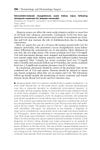1 citations,
January 2020 in “International Journal of Trichology” High YKL-40 levels predict early hair loss and hidden metabolic issues.
 June 2023 in “Benha Journal of Applied Sciences”
June 2023 in “Benha Journal of Applied Sciences” People with chronic hair shedding have lower antioxidant levels in their blood compared to healthy individuals.
 30 citations,
August 1992 in “The Journal of Clinical Endocrinology and Metabolism”
30 citations,
August 1992 in “The Journal of Clinical Endocrinology and Metabolism” Finasteride doesn't affect hormone levels in normal men.
 April 2007 in “Nature Clinical Practice Urology”
April 2007 in “Nature Clinical Practice Urology” Finasteride lowers PSA levels about the same whether taken at 1 mg or 5 mg daily.
July 2020 in “Endocrine practice” A 13-year-old boy with Cushing syndrome has high cortisol levels from a pituitary gland issue and underdeveloped sexual characteristics.
 20 citations,
October 2017 in “Clinical Endocrinology”
20 citations,
October 2017 in “Clinical Endocrinology” The conclusion is that removing both ovaries is the best treatment for excess male hormones in postmenopausal women, with medication as another option, and managing insulin resistance is important for diagnosis and treatment.
14 citations,
January 2013 in “Journal of the Egyptian Women's Dermatologic Society /Journal of the Egyptian Women's Dermatologic Society”  36 citations,
November 2009 in “Journal of Investigative Dermatology”
36 citations,
November 2009 in “Journal of Investigative Dermatology” Prolactin may affect hair growth differently based on gender and scalp area.
 10 citations,
February 2007 in “Clinical techniques in small animal practice”
10 citations,
February 2007 in “Clinical techniques in small animal practice” Dogs with sex hormone imbalances may not drink or pee a lot but often lose hair on their body and can have reproductive system issues.
 1 citations,
September 2017 in “Frontiers in Laboratory Medicine”
1 citations,
September 2017 in “Frontiers in Laboratory Medicine” Gut flora changes could potentially indicate depression, but more research is needed.
 282 citations,
April 2007 in “Journal of Agricultural and Food Chemistry”
282 citations,
April 2007 in “Journal of Agricultural and Food Chemistry” Apple polyphenol, especially oligomeric procyanidins, can reduce fat absorption and lower blood fat levels.
 506 citations,
March 2005 in “The Journal of Clinical Endocrinology and Metabolism”
506 citations,
March 2005 in “The Journal of Clinical Endocrinology and Metabolism” Testosterone therapy improves physical function, strength, and body composition in older men with low testosterone levels.
December 2022 in “Biomedicine” Men with early onset hair loss are more likely to have high uric acid levels.
18 citations,
November 1998 in “Comparative biochemistry and physiology. Part A, Molecular & integrative physiology” Changes in prolactin and DHEA levels are not required for the start of mink hair growth cycles.
Higher alarin levels might link hair loss and metabolic syndrome.
1 citations,
February 2021 in “Benha Journal of Applied Sciences” Higher IMA levels in male AGA patients, especially if obese, may link AGA to metabolic and heart issues.
5 citations,
February 2021 in “JCPSP. Journal of the College of Physicians & Surgeons Pakistan” Early-onset hair loss in young males is linked to a higher risk of metabolic syndrome.
June 2021 in “The American Journal of the Medical Sciences” Androgenetic alopecia is linked to a higher risk of coronary heart disease due to certain genetic factors and high homocysteine levels.
August 2020 in “Benha Journal of Applied Sciences” Higher FABP4 levels may help diagnose androgenetic alopecia early.
January 2021 in “Menoufia Medical Journal” People with early-onset androgenetic alopecia may have a higher risk of heart disease due to abnormal blood lipid levels.
 January 2012 in “The Year book of dermatology”
January 2012 in “The Year book of dermatology” A woman developed severe kidney injury from using simvastatin with ciclosporin, highlighting the need for careful monitoring when combining these drugs.
Low Vitamin D3 levels are linked to hair loss in female students in South India.
12 citations,
May 2005 in “Fertility and Sterility” Higher insulin levels are linked to larger ovaries in women with idiopathic hirsutism.
1 citations,
January 2020 in “Egyptian Journal of Dermatology and Venereology” Higher testosterone and DHT levels are linked to hair loss in men, but not to prostate cancer risk.
March 2022 in “Benha Journal of Applied Sciences” AGA patients have higher insulin resistance and serum progranulin levels, suggesting a link to metabolic issues.
July 2018 in “Benha Journal of Applied Sciences” Higher homocysteine levels may predict hair loss severity.
 4 citations,
July 2017 in “Medicine”
4 citations,
July 2017 in “Medicine” The document concludes that managing PCOS involves lifestyle changes, medication for symptoms, and weight loss for fertility improvement.
 13 citations,
December 1991 in “Annals of the New York Academy of Sciences”
13 citations,
December 1991 in “Annals of the New York Academy of Sciences” Researchers created a lab model to study human hair growth, showing it can grow and self-regulate outside the body.
 21 citations,
June 1990 in “British Journal of Dermatology”
21 citations,
June 1990 in “British Journal of Dermatology” Systemic retinoids are effective for psoriasis but have side effects; benefits may outweigh risks, especially when reducing cancer risks from other treatments.
 14 citations,
January 1990 in “Fertility and Sterility”
14 citations,
January 1990 in “Fertility and Sterility” Some patients with high prolactin levels don't show symptoms because they have a form of the hormone that's less active.













